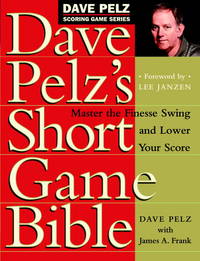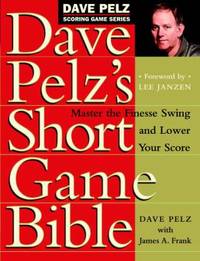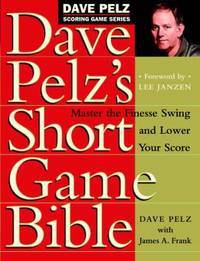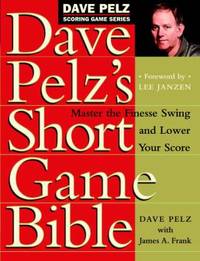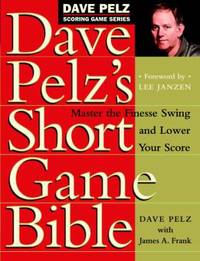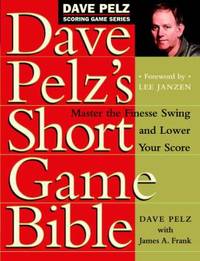From the publisher
NATIONAL BESTSELLER - Internationally revered golf instructor Dave Pelz's bestselling classic can show you the way to lower scores by improving your short game. With a Foreword by Lee Janzen, two-time U.S. Open winner and eight-time winner on the PGA Tour. "He who rules the short game collects the gold."--Dave Pelz's Golden Rule of Golf
Fed up with trying to imitate the pros, buying the latest expensive equipment, and seeing your handicap stay the same? The pros know, as you are about to learn, that while others teach golfers how to swing, Dave Pelz teaches golfers how to score...and win. The result of decades of scientific research studying thousands of golfers, Dave's philosophy is as simple as it is revolutionary and groundbreaking: Instead of practicing the wrong things the right way, or the right things the wrong way, Pelz shows you how to find your own personal weaknesses and how to improve them to efficiently lower your scores. Packed with all the knowledge, charts, and photos needed to learn from the master, Dave Pelz's Short Game Bible is the essential book for every golfer who's looking to improve his or her game. A former physicist for NASA, Dave brings a scientific rigor to his research and instruction that has made him the top short-game expert in the world. His renowned golf schools and clinics focus exclusively on putting and the short game, attracting top players like Tom Kite, Colin Montgomerie, two-time U.S. Open champion Lee Janzen, reigning PGA champion Vijay Singh, Steve Elkington, Payne Stewart, Peter Jacobsen, and many LPGA players including Annika Sorenstam and Liselotte Neumann.
First line
In golf, how to play inside of 100 yards is the prime determinant of how you score.
From the jacket flap
Dave Pelz's Short Game Bible is the first book in a four-book series, The Dave Pelz Scoring Game Series. The next volume in the series will be Dave Pelz's Putting Bible.
"He who rules the short game collects the gold."--Dave Pelz's Golden Rule of Golf
Fed up with trying to imitate the pros, buying the latest expensive equipment, and seeing your handicap stay the same? The first book by bestselling author and internationally revered golf instructor Dave Pelz since Putt Like the Pros, his bestselling classic, Dave Pelz's Short Game Bible can show you the way to lower scores by improving your short game. The result of decades of scientific research studying thousands of golfers, Dave's philosophy is as simple as it is revolutionary and groundbreaking: Instead of practicing the wrong things the right way, or the right things the wrong way, Pelz shows you how to find your own personal weaknesses and how to improve them to efficiently lower your scores. Packed with all the knowledge, charts, and photos needed to learn from the master, Dave Pelz's Short Game Bible is the essential book for every golfer who's looking to improve his or her game. Dave's approach to golf is easy to understand: 80 percent of the strokes golfers lose to par are determined by their play within 100 yards of the green--the crucial scoring game. The most important and yet the least focused-on aspect of golf, your short game, can indeed make or break your entire game. And nobody teaches the short game like Dave Pelz. His renowned golf schools and clinics focus exclusively on putting and the short game, attracting top players like Tom Kite, Colin Montgomerie, two-time U.S. Open champion Lee Janzen, reigning PGA champion Vijay Singh, Steve Elkington, Payne Stewart, Peter Jacobsen, and many LPGA players including Annika Sorenstam and Liselotte Neumann. The pros know, as you are about to learn, that while others teach golfers how to swing, Dave Pelz teaches golfers how to score . . . and win.
A former physicist for NASA, Dave brings a scientific rigor to his research and instruction that has made him the top short-game expert in the world. Dave has observed and then taught thousands of golfers to improve their ability to score better. The years he has spent studying the short game, including chipping, lobs, pitches, distance wedges, and bunker play, have resulted in an unequaled expertise and a fascinating body of knowledge on golf, with the statistics and data to back it up. In this new book, Dave for the first time shares the understanding and techniques he has taught the pros, including a wide array of innovative tests and exercises for mastering those deceptive and high-pressure shots of the short game. Dave Pelz's Short Game Bible is an essential book for golfers of all levels. Covering everything golfers need to know to improve their short game, Dave's system can--and will--help you to consistently shoot lower scores.
Details
-
Title
Dave Pelz's Short Game Bible: Master the Finesse Swing and Lower Your Score
-
Author
Dave Pelz
-
Binding
Hardcover
-
Edition
First Edition
-
Pages
448
-
Volumes
1
-
Language
ENG
-
Publisher
Doubleday Books, New York, New York, U.S.A.
-
Date
May 11, 1999
-
Illustrated
Yes
-
Features
Bibliography, Dust Cover, Illustrated, Table of Contents
-
ISBN
9780767903448 / 0767903447
-
Weight
2.66 lbs (1.21 kg)
-
Dimensions
9.63 x 7.38 x 1.26 in (24.46 x 18.75 x 3.20 cm)
-
Library of Congress subjects
Short game (Golf)
-
Library of Congress Catalog Number
99017226
-
Dewey Decimal Code
796.352
Excerpt
Chapter 1: Score Counts in Golf
Who Cares About Score?
1.1 Defining the Scoring Game
In golf, how you play inside of 100 yards is the prime determinant of how you score. I don't say this play completely determines your golf scores, just that it is the most significant factor when it comes to writing numbers on your scorecard. I base this statement on more than 23 years of studying golfers and compiling data, which shows that 60% to 65% of all golf shots occur inside 100 yards of the hole. More important, about 80% of the shots golfers lose to par occur inside 100 yards. These results led me to focus on what happens inside 100 yards, what I call the "scoring game," to concentrate my teaching there, and to found the Dave Pelz Scoring Game Schools.
Every golfer's scoring game is a combination of many shots and many decisions. In teaching players how to score, I simplify things this way: I define the game played from 100 yards in to the edge of the greens as the "short game"; the game played on the greens is obviously the "putting game"; and the judgments and decisions made on game management and shot selection constitute the "management game." As you can see in Figure 1.1.1, I've broken the game of golf into five categories, what T call "the five games of golf," which also include the "Mental Game" (fear, anxiety, confidence) and the "Power Game" from outside 100 yards.
Learn to play all five of these games well and you will become a good golfer. And the more you improve your performance in these games, the more you will enjoy your golf.
1.2 Why Is This Book Necessary?
My Short Game Bible focuses completely on play from 100 yards in to the edge of the green. To a true golfer, scoring is what the game is all about, and your short game plays a vital role in determining scoring ability. We don't all have the same natural talent, we can't all hit 350-yard drives like Tiger Woods, and we will never all look the same when we swing a golf club. But if you are in reasonably good health, if you can walk the meadows and see the clouds, smell the grass and hear the birds, if you can feel the breezes and make contact with the little white ball, you can learn to score better. And this book will help you do it.
This is not a book about generating more clubhead speed with your driver or hitting the golf ball farther. Rather, my Short-Game Bible details what I have learned and how I teach the short game, including the distance wedges, pitches, chips, sand shots, lobs, and bump-and-run shots. I hope it will help you learn something about them.
Now, the first point I want to make is about putting. Sound a little strange? Stick with me.
1.3 The "Golden Eight"
What do you think is the most important distance in golf? The 250 yards of the tee shot? The 150 yards of the perfect approach? The 20 yards of most chips? Or the putt from three feet and in? Actually, it's none of these. The most important distance in golf is the "Golden Eight," the eight feet that separate a two-foot putt from a 10-foot putt.
More simply put, the Golden Eight is the distance difference between making and missing most of your putts.
I've studied thousands of golfers, at all skill levels, and found that nearly everybody makes almost every putt from inside two feet. Go a little farther away, to three feet, and golfers begin to miss (even Tour pros make only 85% to 95% of their three-footers). Step back to five feet and pros hole only about 65%, while amateurs, if they're lucky, are making about 50%. And at six feet, the best in the world, the PGA Tour professionals, sink about 50%, plus or minus 5%. From 10 feet, no one consistently holes better than 25%. And from over 15 feet? One in 10, best case, even for the pros.
So your best chance of making a putt is if it's inside 10 feet. And how do you get it there? Answer: The wedges, pitches, chips, and bunker shots of your short game.
Why the Short Game?
1.4 Giving Your Short Game Its Due
There are more than 15,000 golf professionals in this country, most of whom teach the game. There are another 7,000-plus assistant pros who teach (and another 5,000-plus who want to teach), and 25 or so successful golf schools. What most of these teachers and schools have in common is that they emphasize the full swing, what I call the power swing. That is what golfers expect to be taught, and that's what they get. As a result--and I'm not being critical, but it's a fact--the short game takes a backseat in the teaching of golf.
I am publishing this book because your short game deserves more attention than that. Your short game is not like any of golf's other games; it should not be played as if it's a throttled-down version of the power game, as some pros teach. Golfers who use muscle control and deceleration to turn their power swings into short shots are doomed to frustration. The short game needs to be taught separately because--and here comes the good part--it is the most important skill you can improve to lower your scores.
As mentioned above, the short game controls the Golden Eight feet. If statistics prove that you'll probably miss a 10-footer but you're almost 100% from two feet away, then you'd rather be putting from two feet than 10, right? How do you get there? For most of us, most of the time, the length of our first putt is a function of our short game.
My research also shows that the short game is the single greatest influence on the success or failure of players on the PGA Tour. I'll explain the data in detail later, but right now, suffice it to say, I believe--and can prove--that it is the short game that wins the big money, wins the big tournaments, and keeps the pros on tour year after year.
(Don't get too hung up on the pros. My data, which I'll refer to over and over in this book, has been collected from players of all skill levels, not just Tour players but also middle- and high-handicappers, even beginners.)
And here's another piece of information that may surprise you, especially if you're an average or new golfer: The higher your scores, the more you need a good short game. Beginners and high-handicappers hit fewer greens than better players, which means they face more short-game shots per round. The more you need your short game, the better it has to be if you're going to become a good player (i.e., a low scorer). So while the short game is the bread-and-butter skill to the Tour players, it's of even greater consequence to "normal" golfers.
1.5 Learn How to Learn
The purpose of the Short Game Bible is not simply to tell you how great shortgame players look or swing. It's to help you learn how to be a better wedge player, a better sand player, and a better chipper and pitcher of the golf ball when you get close to the greens. But before you can achieve a better short game for yourself, you must first learn both what you need to know and how to learn it.
In one after another of my schools around the country, I see golfers struggling to master their short games when they have no real understanding of what it is they're trying to accomplish. In these cases, it doesn't matter how hard they try, how much they practice, how diligent they are, or how much they care. When they don't know the skills and techniques required to execute good shots, or how to practice to learn them, they will not be successful in learning them. The truth is, very few golfers, even at the Tour-player level, understand the details and realities of their short games.
Therefore, what I want you to learn from this book is:
1. What you need to learn
2. How to learn it
3. Programs for ingraining your learning so your results will serve you on the golf course
By reading this book it is my hope that you not only learn how to become a better short-game player, but that you actually become one. If that happens, I've done my job and you will enjoy the game all the more. We'll both be satisfied, because not only will you shoot lower scores but you'll know how you developed that ability. You'll be able to fine-tune and touch up your short game later, perhaps many years later, after some bad habits may have snuck into your game.
My ultimate goal is to help you to become your own best teacher, and to help you use that skill to improve your short game for as long as you continue to play.
1.6 The Pelz Overview of Scoring
My Short Game Bible can best help your short game if you both understand what's being said and follow the recommended drills. It also will help if you understand where this information fits into the overall development of your ability to score. Figure 1.6.1 shows how I view your learning process, and how this book can fit in to help you improve your scoring game.
Don't be intimidated or discouraged by the number of different shots and areas of practice that are comprised by the scoring game. At every skill level, the putting and short-game skills are easier to learn and groove than the skills of the power game. (The management game is the easiest to learn, but only once you have repeatable skills in the power, short, and putting games.) None of the concepts or motions in the short game are difficult if you take the time to understand them and then properly practice them. It's all a matter of knowing what to do, how to do it, then doing it often enough.
All of the learning aids, books, and video- and audiotapes referenced in Figure 1.6.1 may not be available when you are first reading this book, but they are all works in progress. If you are interested, contact the numbers or addresses listed at the back of the book.
Where I Come From
1.7 How I Got Here
I've been playing golf almost my entire life. I played in my first tournament when I was seven. I remember because I got my picture in the newspaper for playing a match against a man aged 77. We had a heck of a match, both shooting about 150. I don't remember who won, but I do remember that picture. As a now-famous seven-year-old, I was hooked on golf for life.
At 12, I lost in the finals of the Youngstown, Ohio, Pee-Wee tournament, and I was convinced that the lucky bounce Tony Joy got to beat me was just the experience I needed to survive, to be a winner from then on. Later, at Boardman and Willoughby High Schools in Ohio, I played first positions on the golf teams. I played just well enough to get a few college coaches interested, although my sister could beat me until I was 16. They didn't allow her to play on our team, however, because it embarrassed the boys when she beat them.
I attended Indiana University on a four-year golf scholarship. Even though my main reason for going to college had been to get prepared to play the PGA Tour, I majored in physics, a grounding that has served me very well. By the end of my Indiana years, I finally realized I was more likely to succeed in a laboratory than on the PGA Tour. Although I thought I could play pretty well, I kept being beaten by other Big Ten golfers, like John Konsic of Purdue, Jack Rule of Iowa, and especially a big kid from Ohio State named Nicklaus. I could read the writing on the wall.
I registered and briefly attended graduate school at the University of Maryland, but dropped out when I got a job in space research at NASA's Goddard Space Flight Center outside Washington, D.C. I gave up golf for a few years, as I couldn't afford to belong to a private club. Instead, I took up auto racing. I put aside my clubs in favor of a Jaguar, a Sports Car Club of America competition license, and a helmet. After two years of racing and my third crash, I realized that if you have a bad day on the golf course you get disgusted and angry, but at least you live to compete another day. Have a bad day on the race course and they bury you.
I loved my job at NASA, but once a golf nut . . . So I started playing again. When I wasn't working, I played in tournaments; at night I put my research skills to work on my game. I was just good enough to compete on a national level, qualifying for the 1974 U.S. Amateur at Ridgewood Country Club in New Jersey. I lost in the second round, not only because I ran into a better player, but also because the putter I was using, a club of my own design, was disallowed by the United States Golf Association.
1.8 A Businessman? No!
Shortly thereafter, I was approached by a group of local businessmen who knew I'd designed a putter that had had a dramatic effect on my game. They agreed to set me up in business if I would leave NASA. They said we'd all make a fortune, but it didn't quite work out that way.
While my wife and three children were somewhat apprehensive about my new career, and my parents were aghast, I assured them everything would be fine. Then I promptly lost everything I had ever made. In the first year, I lost the $75,000 the investors put up. In year two, I mortgaged my home, both cars, and emptied my NASA retirement fund, a total of $40,000, and lost that. By the third year, I'd been befriended by a number of PGA Tour players, six of whom invested in me because they thought my research was helping their games. I lost their $25,000. In the fourth year, I thought I was a success because I was losing less than the year before, but my accountant told me I'd been bankrupt for two years. I thought I was doing fine and reasoned that if I kept at it, I'd get there soon.
Soon came very slowly, as shown in Figure 1.8.1. I didn't make a significant profit until almost 18 years later. But I'm still in golf, and still loving it. I eat it, sleep it, dream it. Just ask my wife, my family, and my friends among the club and Tour pros. The reason golf still excites me is that as a student of the game, I continue to learn new things on a regular basis.
Let me admit right now that this isn't the first time I thought I was a "student of the game." I thought the same thing in college. Back then, I kept statistics on the number of fairways I hit, my greens in regulation, three-putts--you name it, I quantified it. I thought I understood golf.
I was wrong. Dead wrong.
How All This Happened
1.9 The Day That Changed My Life
Since starting in the golf business, I've totally changed my view of golf. That change began one day during the Kemper Open, which used to be played at Congressional Country Club outside Washington, D.C. I was trying to decide if I wanted to stay in the golf business or not. I'd been losing quite a bit of money (it was only the beginning of my losses, but I didn't know that then) and wasn't feeling very secure, when I found myself watching a Tour professional named Gay Brewer warming up on the practice tee.
Let me tell you a little about Gay Brewer. He won the 1967 Masters. He had another dozen or so victories on the Tour. He is still playing on the Senior PGA Tour today. He has always been a consistent money-winner. He is a player.
But a swinger? No sir. He had perhaps the worst-looking golf swing I'd seen on someone who can really play. Instead of a one-piece takeaway, his first move was to put the clubhead low to the ground and behind him. Then he brought the club straight up in the air so at the top of his backswing it pointed out in front toward his caddie. Then he wiggled it three or four times to make sure anybody who might be watching was unsure just what was happening. From there, he made a reasonably solid move down and through the ball, hitting powerful low hook shots. It was not an impressive sight. (It still isn't, but it's still the swing he uses today.)
I stood there watching Brewer hit hook after hook, and I thought, "This man won The Masters. This man is a player. He's among the top 10 money winners on the PGA Tour. In many events he beats Jack Nicklaus and Tom Weiskopf, both of whom own reasonably good-looking golf swings. How does he do it with that swing?"
As if that weren't enough, standing next to Brewer on the range was a young fellow who had the most beautiful swing I'd ever seen. His backswing, downswing, and follow-through were all as Ben Hogan had prescribed: on the proverbial plane of glass. His shots traveled on long, high, penetrating trajectories; his drives consistently flew 20, 40, sometimes 50 yards past Brewer's; and he looked better with every club in the bag. He looked like an awesome player, but I didn't recognize him. I checked the name on his bag and still didn't recognize him, so I looked him up in the press guide. There I found out that this fellow had been on tour for four years and had never finished in the top 100 on the money list. He was not a great player.
Watching Brewer and this young fellow, a question formed in my mind: "How can this beautiful golf swing not outperform Gay Brewer's incredible move?" At that time, I assumed the reason had to be putting.
Just then, they left the driving range together, walked to the practice green, and started to putt. I followed and watched in amazement as the young man executed one of the best-looking, most rhythmic putting strokes I'd ever seen. He made putt after putt, pouring them into the cup. Then I turned to watch Brewer, who had, in fact, a worse-looking putting stroke than he had a golf swing. He brought the putter inside on the takeaway, lifted it up, and shoved it straight out away from his body to a position three to four inches outside the target line. Then he turned the putterface down and made a forward stroke that looked as if he were trying to kill a bug sitting on the outside-back quadrant of the ball, which squirted off his putter as the club smashed into the green. There was no follow-through, nothing that even resembled a stroke as we know it today. It was amazing.
Again I thought, "Masters champ? Top 10 money winner? Great player?" It was at that moment, as I watched Gay Brewer practice missing four-foot putts, that it occurred to me that maybe I didn't understand this game.
1.10 I Followed, Watched, and Wondered
It so happened that Brewer and the young man were paired together that day. I knew I had to watch them for a full round and find out if Brewer truly was a better player. (To this day, I don't reveal the young man's name because he never made it on the Tour. He tried for another year or two, lost his Tour card, and I don't think he ever tried again.)
So out I went, walking and watching every shot the two of them hit for 18 holes. Then came the moment that changed my life.
They finished the round and left the 18th green. I'd been very impressed with the young man's play. He had hit the ball well, struck a number of good-looking shots, and putted well. "The kid played well today,' I said to myself. "He may not have made much money so far, but he must be improving. He'll be a real fine player someday."
As for Brewer, I didn't remember one good thing about his round. I didn't notice his game, because nothing he did was impressive.
I was preparing to go out and watch some more players and see if I could learn anything important about the game, when my life changed. While I was standing next to the scoreboard, the scores from the morning rounds were posted: Brewer had shot a 69, the young man a 73.
Gay Brewer, whom I hadn't noticed or been impressed with at all, had taken four fewer strokes than the young man who had hit the ball so beautifully. At that instant, I concluded that I truly did not understand the game of golf. I said, "Pelz, you're going to get killed in this business, because you don't get it. You must not understand how the game is played if you think that kid is a better player than Gay Brewer."
1.11 Think About It
Forget going out to watch any more players that day. I went home and sat by myself in my study. I tried to think and think and think. Why, after all the tournament golf I'd played, after all the practice rounds and balls I had hit in my life, why did I not know enough to tell a great player from someone who couldn't make it on the Tour?
The answers didn't come overnight. But they have come. They have come to me over the years. The more I study the game, the more I study people, the more I measure the ways golfers play and swing, the better I understand how they can improve their ability to score. My goal has become to understand the game well enough to make it simple for golfers to score better and enjoy the game more.
If you are ready to find out what I've learned about the short game, read on. I'll explain the realities of golf in Chapter 2 and why a good short game is vital to your ability to score in Chapter 3. Then, in Cha
Media reviews
Praise for Dave Pelz and the Scoring Game System:
"Do I believe in Dave Pelz? I paid full price to go to his school, and it was the best money I've ever spent. I learned more about my short game and putting in three days than in all my previous years and lessons combined. I know for sure I could not have won my second U.S. Open without the help of Dave Pelz. He has sure improved my scoring game! I'm looking forward to working with him often in the years to come. I AM a believer."
--Lee Janzen
"Dave Pelz has added more irrefutable knowledge to golf instruction than any man alive. This new book is indeed the bible of the short game."
--George Peper, editor-in-chief, Golf Magazine
"In one day's work with Pelz, I learned more about putting than I had known my entire life. . . . None of us out here practiced our short games enough, but those of us who have paid attention to Pelz know it's the way to lower scores."
--Curtis Strange
"Dave Pelz is the most confident person, let alone coach, I've ever been around. His science-based knowledge is the best I've ever seen. I couldn't have won my sixth European Order of Merit without his help. His short-game system is improving my game, and has me the most excited I've ever been about my own ability to score."
--Colin Montgomerie
"Dave Pelz is the best. It's pure and simple. If you want to play your best, you work with the best . . . that's Pelz."
--Steve Elkington
Citations
- Booklist, 07/01/1999, Page 1916
- Ingram Advance, 06/01/1999, Page 124
- Library Journal, 06/01/1999, Page 126
About the author
Renowned golf instructor Dave Pelz is the technical and short-game consultant to GOLF Magazine. A former NASA research scientist, he founded the Pelz Golf Institute to perform research for the good of the game, and he operates four highly acclaimed and popular Dave Pelz Scoring Game Schools across the country. He has improved the games of over 15,000 amateur golfers, 48 PGA players, and 38 LPGA players, and he is also the host of The Golf Channel's #1 instruction program, The Dave Pelz Short Game Show. He lives in Austin, Texas. James A. Frank is the editor of Golf Magazine. He lives in New Jersey.

